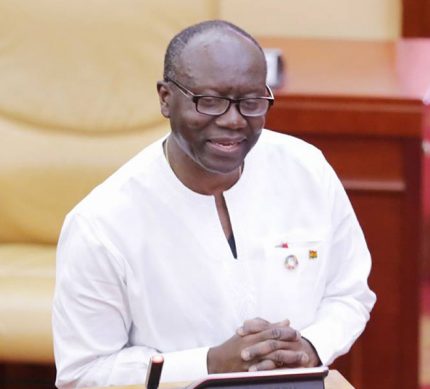Finance Minister Ken Ofori Atta says government had to go through a difficult “healing process” under the IMF prongramme in order to fix a broken economy it inherited in 2017.
He said in 27 months the government “chose a sensible path of recovery” and boldly declared to MPs that the “mission has been accomplished.”
According to him, Ghana’s economy is rising again with a GDP growth rate of 8% higher than the 3% the government inherited in 2017, a fairly stable inflation rate which is now 9% down from the 15% it inherited.
State of the Economy
He was updating Parliament on the state of the economy after Ghana exited the IMF programme.
He also touched on the $3 billion Eurobond issue, as well as the local currency which has seen some topsy-turvy performance.
IMF deal
The Finance Minister chronicled the reasons behind Ghana’s 16th return to the IMF for a bailout in 2014 by the Mahama-led government.
According to him, the outcome of the home grown policies of the erstwhile NDC government was unimpressive, a situation which led to loss of confidence by the market and business community.
Quoting an August 2014 article in the Financial Times newspaper, the minister read the article as saying Ghana, the country which epitomized Africa rising after it struck oil in commercial quantities in 2011 was suddenly facing a huge economic decline with its currency plunging by 40% in 2014.
He said the Mahama government never recovered from the fiscal deficit it suffered in 2012 with the deficit getting even worse in 2016.
Even after going to the IMF for a bailout in 2014, the minister said the Mahama-led government could only successfully manage three programme reviews out of six.
“There was no way it [Mahama government] could exit [the IMF programme] in 2018,” he stated.
Ken Ofori Atta said the Akufo-Addo government had to take bold steps to fix the economy and having successfully ended the IMF programme, they have received the final tranche of $185m to bring to over $934m the total bail-out sum.
Eurobond Issue
He said part of the policy of government was to “borrow at least cost” and reduce debt accumulation which the government has largely succeeded in doing with a reduction from 22% to 14% debt accumulation profile.
According to him, his office together with the Bank of Ghana, the Statistical Service and five lead managers issued a three-tranche sovereign bond of up to $3billion in 27 days.
After a three-day road show of 7, 12, and 31-years issuance, the deal generated strong interest of $22 billion which showed a significant confidence, the minister stated.
Cedi fluctuation
Despite the fluctuating performance of the cedi, the minister said the local currency was still faring better than it did in 2012 and 2016.
Critics are predicting the currency will depreciate to the six dollar mark by close of the year, having inched close to 5.8 cedis to a dollar.
However the currency saw a marginal appreciation last week and sold at around 5.2 cedis to a dollar.
The minister promised that a bi-partisan committee would be set-up to investigate the topsy-turvy performance of the currency.







